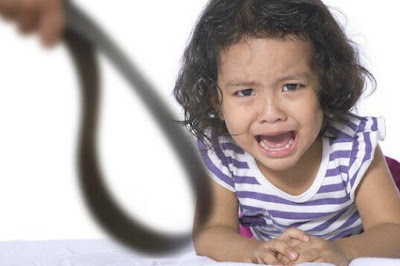Flogging a child or not flogging a child has been a bone of
contention among young parents. The main reason for wanting to flog a child is
to discipline or correct that child for doing something wrong.
The big question is "how often do you flog to correct a
child? And "does your child get the correction or do you end up inflicting
physical injury on the child?"
Sometimes, we do the trial and error method with kids, which
isn't supposed to.
There are several ways of disciplining a child that are more
effective than the use of a cane. But we choose to say these words often:
"He's very stubborn, only the cane can discipline him well". You
forget that children are wired to get accustomed to the things you structure
for them.
Because the cane is a quick fix, children say, "Mummy
and Daddy, will just flog me nothing else"
Understand that discipline is not a quick fix. Discipline is
not obedience to someone else's standards to avoid punishment. It is learning
and applying intentional standards to achieve meaningful objectives.
The mistake most Nigerian parents make regularly is not
correcting a child when he or she does the wrong thing. They turn deaf ears and
shut their eyes to them. They pile up these offences without this child knowing
what wrong they have done. Then comes this day. They feel his cup of offense is
filled. Then flog with the anger of the offences the child has committed over
time, some of which he has forgotten.
If you examine this incident closely, you will notice that
proper discipline was not used; there was no space for correcting the child on
his offenses; instead, there was only a reminder of his offenses and physical
pain.
It's not a good sight to see cane marks on the bodies of
children, some with open wounds that were incurred through flogging.
Just like most people will say, I was flogged by my parents,
and that made me firm. But you will agree with me that it made a lot of
children resent their parents as they couldn't connect with them to share their
worries. Rather, they preferred outsiders or strangers to talk to.
The use of the rod without the actual sense of correction
instills fear in a child rather than discipline or value.
In Wendy Ologe's book "The Discipline that Works",
she made reference to Praise Fowowe article where seven things to consider
before beating your child were considered:
1. Never beat a child for what you have not taught him.
2. Never beat a child unless you have given him enough time
to absorb what you have taught him.
3. Never beat a child if there is another effective way to
correct their behavior.
4. Never beat a child when there is no data to guarantee
that a beating will correct the behaviour.
5. Never, ever beat a child out of anger because you may
injure the child.
6. Never beat a child without first discussing the
punishment with him prior to the offense.
7. Never beat a child without giving him the opportunity to
defend himself and explain the reason for his actions.
Once you run these checks and you still feel the need to go
ahead, then deploy your rod of correction.
But note that the rod doesn't necessarily help one overcome
some bad behaviour.
©️ EWOH DORIS CHISOM

No comments:
Post a Comment